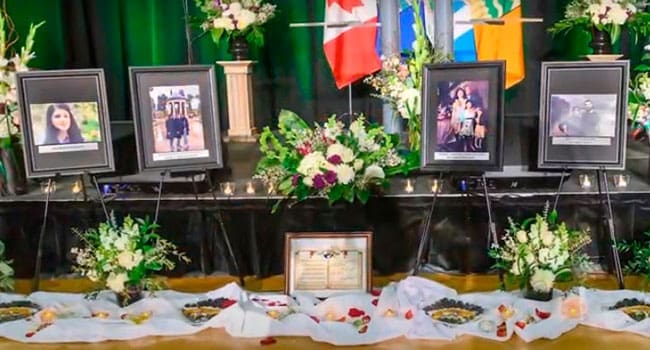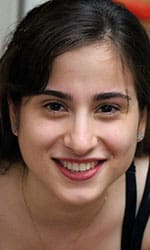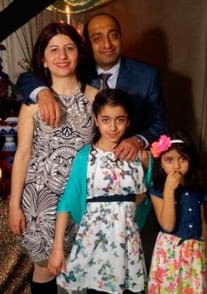Russ Greiner’s artificial intelligence lab is made up of 15 or so grad students, post-docs and others who hold cheerful, heartfelt meetings, and why wouldn’t they? It’s a cohesive group made up of more friends than colleagues.
And the one person most responsible for that cohesion during the 2019 iteration of the team was master’s student Pouneh Gorji.
“We made her the vice-president of fun,” remembered Greiner. “She organized trips for the group to go to places like Elk Island; she organized a movie night and other fun events.
“She was always doing things like this.”
Over the Christmas break that year, Gorji and her husband-to-be, Arash Pourzarabi, also a computing science master’s student, travelled home to Iran and were married on New Year’s Day in a big wedding attended by family and friends.
A week later, on Jan. 8, 2020, Gorji and Pourzarabi were two of 13 Edmontonians – 10 of whom belonged to the University of Alberta community, the other three of whom were immediate family members – and 176 passengers aboard Ukraine International Airlines Flight PS752 who died when their plane was shot down minutes after takeoff from Tehran’s international airport.
“She was really just a wonderful, sweet person,” said Greiner. “The world lost a star.”
According to U of A president emeritus David Turpin, the university lost 10 stars.
He said engineering professors Mojgan Daneshmand and Pedram Mousavi – the couple who died alongside their two young daughters Daria and Dorina in the disaster – were world-class researchers developing things that were, and are, going to change the world. In fact, Turpin said every U of A member on that plane brimmed with potential.
“They were absolutely remarkable individuals, which is how they got to the U of A from Iran,” he said. “And each one of them was working to make the world a better place for everybody.
“Yes, we have these tremendous personal losses. But we also, as a community, as a global community, we’ve been deprived of all those contributions that they were going to make for the rest of their lives.”
A posthumous paper co-authored by Gorji, on the use of machine learning to improve the diagnosis of such ailments as hip dysplasia, glaucoma and fatty liver using inexpensive ultrasound machines, is the first of several research projects that stalled with the downing of PS752, only to be revived by colleagues determined to shine light on these breakthroughs.
Elnaz Nabiyi’s PhD supervisor Ivor Cribben, a business analytics professor in the Alberta School of Business, said there are plans to finish up her research applying machine learning to the problem of predicting the volume of emergency medical services calls in Alberta to help managers assign ambulances and staff and the locations of stations, and to the problem of predicting how many ICU hospital beds might be needed at a given moment.
“She would be a trailblazer in this field,” said Cribben. “She didn’t think there were enough women in science, and that’s why she wanted the PhD.
“She would have finished, and she would have been a star.”
Amir Saeedinia was just about to begin chasing a PhD in the Department of Mechanical Engineering when his life was cut short. He worked on finite element modelling of the material behaviour of coatings, with applications for mitigating wear and corrosion in the oil and gas industry.
Nasim Rahmanifar started a master’s program in mechanical engineering at the U of A in 2019 and was offered to transfer to a PhD program in 2020. She had hoped to devise an in-field assessment of the risk of pressure injury and repetitive strain injury of the shoulder in wheelchair users.
Mohammad Mahdi Elyasi graduated with a master of science degree from the Department of Mechanical Engineering in 2017 after working in the area of fluid turbulence. Before he died, Elyasi moved to Toronto and co-founded a startup called ID Green, which aims to use drones in an innovative crop monitoring service for potato farmers.
Also tragically, the downing of Flight PS752 took the lives of sisters Saba and Sara Saadat, as well as their mother, Shekoufeh Choupannejad, an Edmonton obstetrician and gynecologist.
Saba was an undergrad in the Department of Biological Sciences, following in the footsteps of her older sister, who graduated in 2019 with a bachelor of science in psychology. Sara had been pursuing a career as a psychologist.
Meghan Riddell, assistant professor in the Faculty of Medicine & Dentistry, who brought Saba into her lab as an undergrad in the summer of 2019, once commented, “She was a PhD disguised as an undergraduate.” And even then, her brilliance wasn’t even her best quality.
“It was her way of bringing others together and lifting them,” said Riddell.
Saba tutored, volunteered with the Iranian Heritage Society of Edmonton, taught piano to underprivileged youth on a volunteer basis and worked as a project manager with the Social Engagement, Empowerment and Development Society (SEEDS) on its Helping Hampers campaign. At the university, Saba served as vice-president of the Heart & Stroke Foundation Students’ Association and acted as a mentor to first-year science students.
As with Saba, many of the contributions made by those lost reached beyond academia and touched those in their immediate vicinity.
Daneshmand, for instance, was recently awarded a posthumous Equity, Diversity and Inclusion (EDI) Award for her unequalled efforts to welcome and champion women in STEM fields as a teacher, a mentor and an exemplar of excellence.
“EDI work is exhausting and challenging on champions, but Mojgan kept us motivated and positive,” wrote the friends and colleagues in engineering who nominated her for the award. “There is still much to be done, but Mojgan’s positive words of encouragement and her brilliant smile will provide the fuel we need for years to come even if she is no longer with us.”
That reach into the community has a way of reaching back, as U of A president Bill Flanagan can attest. At the time of the crash, he was part of the Queen’s University community, which had lost one of its own, Amir Moradi.
“All of us continue to work, learn and teach in their honour and to carry on their legacy,” said Flanagan. “We will not forget the contributions of these remarkable individuals.”
Flanagan noted the community’s embrace of those lost first when Canada’s universities – and in large part the U of A community – pulled together to collectively honour the lives cut short, and said the outpouring of community support was a reflection of the positive impact each individual had made.
Since coming to the U of A, Flanagan has seen first-hand how the university community continues to be inspired by them. “I want to thank those who have shared memories, love and support throughout the year.”
And that outpouring of support has carried on for a year, despite COVID-19.
Pegah Salari, a U of A MBA grad, volunteers with The Association of Families of Flight PS752 and community leader who emceed the main memorial service held at the U of A’s Saville Community Sports Centre on Jan. 12, 2020, remembers being buoyed by the response from the community.
“I was really proud of the U of A,” said Salari. “I still remember every single day that our year started with that incident. It still defined 2020 for me, despite everything. I can only imagine how it is for someone who had family members on the flight.”
Over the past year, Salari said a confluence of factors, most notably COVID-19 and tensions around the investigation and response to the downing of the flight, have contributed to a drawn-out healing process.
“I feel like the distractions didn’t allow enough time for people to heal,” she said. “People are resilient so obviously they will get through it, but at the end of the day, they haven’t yet found the time to let what happened sink in and make peace with it.”
In an effort to belay some of that grief, the tributes mounted. At the U of A’s first online convocation on June 12, Gorji, Nabiyi, Pourzarabi, Rahmanifar and Saba Saadat were recognized with posthumous degrees.
As well, nearly 600 donors contributed more than $700,000 to establish the Mojgan Daneshmand, Pedram Mousavi and Victims of the Flight PS752 Memorial Fund. This scholarship fund will support master’s or doctoral students across any field of study for Iranian international students and Iranian-Canadian students starting in the fall of 2021.
That the community rose to the occasion was a sign of the pain and grief so many were experiencing.
Kevin Friese, assistant dean of students, health and wellness services, said the university saw significant uptake in individuals reaching out for assistance initially.
“Given the scale of the tragedy, we had to bring resources on campus, not just for one particular population but for a range of populations.”
Coming up on the anniversary of the tragedy, Friese said the university is making sure support is still there for individuals who may experience strong emotions as they reflect on the tragedy and remember their friends and colleagues.
“It really underscores the need for people to be mindful of where they are at emotionally and check in with each other,” he said.
“Especially with the pandemic, we need to allow ourselves that space to be able to be sad and to grieve. But if it’s causing you to struggle, you should reach out for support.”
Turpin, who concluded his presidency in July, said not a day has gone by where he hasn’t thought about the unthinkable.
“It really is a reminder to all of us to recognize how ephemeral life is and how fragile it is. And to make the most of our friends and family, and to enjoy the time we have with each other,” he said.
“There’s not been a day since January, even with all what’s happened since, that I haven’t thought about that day. Many, many others in our community will have a tough time on that day. And I think many will take some time just to reflect.”
| By Michael Brown
The views, opinions and positions expressed by columnists and contributors are the author’s alone. They do not inherently or expressly reflect the views, opinions and/or positions of our publication.










